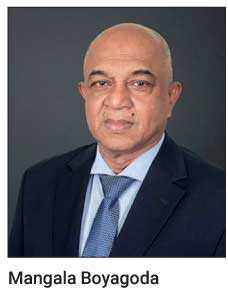Monday Feb 23, 2026
Monday Feb 23, 2026
Tuesday, 7 April 2020 01:55 - - {{hitsCtrl.values.hits}}
Veteran financial services expert Mangala Boyagoda has shared with authorities several useful recommendations on how liquidity in debt markets can be enhanced, thereby stimulating and fast-tracking economic activities.
His suggestions come amidst partial shutdown of financial markets in the country as part of overall measures to mitigate the spread of novel coronavirus (COVID-19).
Boyagoda says the Government should convert all existing Government-guaranteed Road Development Authority (RDA) and Urban Development Authority (UDA) and other loans of State-Owned Entities (SOEs) through the banking system into short, medium- and long-term deep discount bonds.
“This will help differ cash flows, as the institutions then need to pay at maturity, freeing up their cash flows and providing further liquidity to settle contractors to continue with infrastructure projects,” explained Boyagoda, who is a veteran banker with expertise in treasuries, investment banking and government debt securities, having served multiple organisations such as DFCC Bank, Standard Chartered Bank, Union Bank and Bank of Ceylon.
Currently the Chairman of Wealth Lanka Management Ltd., and Director at Wealth Trust Securities, he also suggests the Government should allow banks to use in part or in full the Government-guaranteed deep discount bonds as part of their liquid assets portfolios, so that banks can use the Government securities presently held as liquid assets to raise additional liquidity using the Central Bank discount window presently at 6%.
“Banks should lend the additional funds raised through the Central Bank window to corporate sector at 8%, keeping a 2% margin over the Central Bank discount rate, to stimulate the economy,” pointed out Boyagoda. He said that future borrowings of corporations and SOEs in full or part should be via the issue of debt securities preferably deep discount bonds with Government guarantees instead of bank loans to attract investments, especially from EPF, ETF and insurance companies.
Another suggestion is allowing insurance companies to use these bonds as permitted instruments when computing capital adequacy ratios to attract investments.
“The ETF could use these deep discount bonds as capital hedge instruments by investing the unearned interest portion in the share market at the right time,” he added.
Boyagoda also wants the Government to explore the possibility of Government corporations and SOEs using UPAS structure for all Letters of Credit (LCs) imports to get international funding up to one year and cite LCs to ease pressure in the foreign exchange market.
“At present total hedging cost for one-year UPAS transactions is below 7.5% per annum in rupees including USD interest and forward exchange hedging cost,” pointed out Boyagoda.
He also suggests that the Government must formulate a national policy on hedging of crude oil and petroleum products to take the advantage of the present low crude oil prices.
Another recommendation is the setting up of a Risk Management Unit under the Finance Ministry to evaluate, identify and manage market risk of all SOEs.